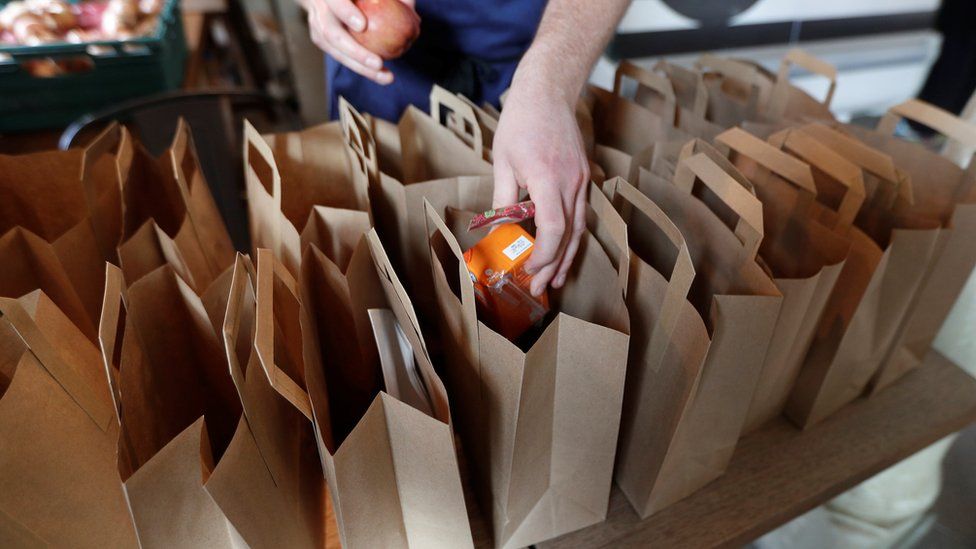
The company behind the controversial free school meals that sparked an outcry in January has apologised again.
"The quality and quantity of some food parcels fell short of our usual high standards," said Compass, which owns Chartwells, the school meal supplier.
The meals led to a row when one mum posted a picture of them on Twitter.
Compass investigated the meals and said it had now "taken several corrective measures".
They include improved supply chain processes, additional guidance and resources for workers, and stronger quality assurance checks.
Chartwells has also been providing breakfasts to all children currently receiving a lunch parcel from it since 25 January.
"We will also provide those same children with lunch and breakfast parcels through the February half term break," Compass said, with the firm promising to cover the costs of doing so.
'Poverty parcels'
Food parcels are currently being sent to school children in England who would normally get free school meals.
In January, one mother calling herself Roadside Mum posted a photo on Twitter of the free school meal that had been supplied to her and was supposedly worth £30.
It consisted of two carrots, two potatoes and a tin of baked beans and a small range of other food items: she calculated the cost to be only about £5.
The outcry led to an urgent investigation by the government after footballer Marcus Rashford said the food parcels were "just not good enough" and food poverty campaigner Jack Monroe accused the company of providing a "poverty picnic".
Chartwells acknowledged the food was insufficient.
In a statement at the time it said: "In our efforts to provide thousands of food parcels a week, at extremely short notice, we are very sorry the quantity has fallen short in this instance."
In its latest trading update, Compass said: "We have apologised to everyone who has been affected."
'Torrid time'
Compass reported improved figures for the last three months with its operating margin climbing to 2.7% to the end of December compared to 0.6% in the previous three months.
It put that down to "a series of actions we have taken over the last year to adapt our operations and to manage our cost base more flexibly, including contract renegotiations and resizing of the business".
However, it said the group's organic revenue for the three months to 31 December 2020 was down 33.7%, which was "in line with our expectations, given the protracted lockdown measures to contain the virus during the winter months".
It warned that "although the news around vaccinations is encouraging, the pace of volume recovery remains uncertain".
But looking ahead it said it expected "a return to organic revenue growth, continued margin improvement and returns to shareholders over time".
Sophie Lund-Yates, equity analyst at Hargreaves Lansdown, said: "From an investment perspective, this [school meals] chapter has been an unwelcome addition to what is a torrid time for Compass, and won't have done the company's reputation any favours."
Contract catering is an incredibly tough place to be when the world shuts down, she pointed out.
Volumes are barely edging forwards, meaning the bottom line is being protected through cost cutting.
"That's prudent business sense, but isn't a long-term solution. If it takes too long for stadiums and schools to fill back up, Compass will struggle to pump margins up any time soon."
https://news.google.com/__i/rss/rd/articles/CBMiLGh0dHBzOi8vd3d3LmJiYy5jby51ay9uZXdzL2J1c2luZXNzLTU1OTMxOTk00gEwaHR0cHM6Ly93d3cuYmJjLmNvLnVrL25ld3MvYW1wL2J1c2luZXNzLTU1OTMxOTk0?oc=5
2021-02-04 09:59:00Z
CBMiLGh0dHBzOi8vd3d3LmJiYy5jby51ay9uZXdzL2J1c2luZXNzLTU1OTMxOTk00gEwaHR0cHM6Ly93d3cuYmJjLmNvLnVrL25ld3MvYW1wL2J1c2luZXNzLTU1OTMxOTk0
Tidak ada komentar:
Posting Komentar